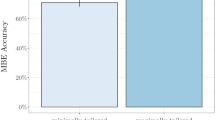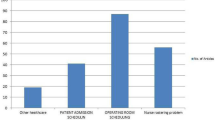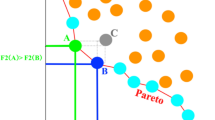Abstract
In this paper, we present our solver for the new variant of the University Timetabling Problem, which was introduced in the framework of Fourth International Timetabling Competition (ITC2019). This problem is defined on top of previous course timetabling problems in the literature, but introduces several new elements, both in terms of new features like student sectioning and new required and optional elements like distribution constraints. Our approach for solving this problem is based on the simulated annealing metaheuristic and consists of two phases. The first phase focuses on finding a feasible solution, and the second phase attempts to optimize the final score while keeping the solution feasible. Our solver detects local optima and applies gradual penalization to force solutions to new neighborhoods. The solver also detects required constraints which are difficult to satisfy and performs a specialized search on them. These adaptively applied mechanisms allow the solver to find feasible solutions for all problem instances of the competition. Results show that our solver gives good overall results and is competitive against other approaches presented in ITC2019.




Similar content being viewed by others
References
Bellio, R., Ceschia, S., Di Gaspero, L., Schaerf, A., & Urli, T. (2016). Feature-based tuning of simulated annealing applied to the curriculum-based course timetabling problem. Computers & Operations Research, 65, 83–92.
Bettinelli, A., Cacchiani, V., Roberti, R., & Toth, P. (2015). An overview of curriculum-based course timetabling. Top, 23(2), 313–349.
Bykov Y. (2003). The description of the algorithm for international timetabling competition. International Timetable Competition,
Cambazard, H., Hebrard, E., O’Sullivan, B., & Papadopoulos, A. (2012). Local search and constraint programming for the post enrolment-based course timetabling problem. Annals of Operations Research, 194(1), 111–135.
Ceschia, S., Di Gaspero, L., & Schaerf, A. (2012). Design, engineering, and experimental analysis of a simulated annealing approach to the post-enrolment course timetabling problem. Computers & Operations Research, 39(7), 1615–1624.
Cordeau1, R. M., Cordeau, J. -F., Jaumard, B., & Morales, R. (2003). Efficient timetabling solution with tabu search.
Di Gaspero, L. & Schaerf, A. (2003). Timetabling competition ttcomp 2002: solver description. International Timetabling Competition.
Di Gaspero, L., McCollum, B., & Schaerf, A. (2007). The second international timetabling competition (itc-2007): Curriculum-based course timetabling (track 3). Citeseer: Technical report.
Eckersley, A. (2004). An investigation of case-based heuristic selection for university timetabling.
Efstratios, R., Eric, i., Robert, S., & Heche, J.-F. (2021). International timetabling competition 2019: A mixed integer programming approach for solving university timetabling problems.
Er-rhaimini, K. (2021). Forest growth optimization for solving timetabling problems.
Gashi, E., & Sylejmani, K. (2020). Simulated annealing with penalization for university course timetabling.
Geiger, M. J. (2012). Applying the threshold accepting metaheuristic to curriculum based course timetabling. Annals of Operations Research, 194(1), 189–202.
Goh, S. L., Kendall, G., & Sabar, N. R. (2019). Simulated annealing with improved reheating and learning for the post enrolment course timetabling problem. Journal of the Operational Research Society, 70(6), 873–888.
Gunawan, A., Ng, K. M., & Poh, K. L. (2012). A hybridized Lagrangian relaxation and simulated annealing method for the course timetabling problem. Computers & Operations Research, 39(12), 3074–3088.
Henderson, D., Jacobson, S.H., & Johnson, A.W. (2003). The theory and practice of simulated annealing. In Handbook of metaheuristics, (pp. 287–319). Springer.
Holm, D. S., Mikkelsen, R. Ø., Sørensen, M., & Stidsen, T. R. (2021). A mip based approach for international timetabling competation 2019.
Holm, D. Sø., Mikkelsen, R. Ø., Sørensen, M., & Stidsen, T. J. R. (2020). A mip formulation of the international timetabling competition 2019 problem.
Kalender, M., Kheiri, A., Özcan, E., & Burke, E. K. (2012). A greedy gradient-simulated annealing hyper-heuristic for a curriculum-based course timetabling problem. In 2012 12th UK workshop on computational intelligence (UKCI), (pp. 1–8). IEEE
Kirkpatrick, S. (1984). Optimization by simulated annealing: Quantitative studies. Journal of Statistical Physics, 34(5–6), 975–986.
Kostuch, P. (2003). Timetabling competition-sa-based heuristic. International Timetabling Competition.
Lemos, A., Monteiro, P. T., & Lynce, I. (2021). Itc-2019: A maxsat approach to solve university timetabling problems.
Lim, A., Rodrigues, B., & Zhang, X. (2006). A simulated annealing and hill-climbing algorithm for the traveling tournament problem. European Journal of Operational Research, 174(3), 1459–1478.
Lü, Z., & Hao, J.-K. (2010). Adaptive tabu search for course timetabling. European Journal of Operational Research, 200(1), 235–244.
Lundy, M., & Mees, A. (1986). Convergence of an annealing algorithm. Mathematical Programming, 34(1), 111–124.
Mall, R. (2018). Fundamentals of software engineering. Delhi: PHI Learning Pvt. Ltd.
Méndez-Díaz, I., Zabala, P., & Miranda-Bront, J. J. (2016). An ilp based heuristic for a generalization of the post-enrollment course timetabling problem. Computers & Operations Research, 76, 195–207.
Müller, T., Rudová, H., & Müllerová, Z. (2018). University course timetabling and international timetabling competition 2019. In Proceedings of 12th international conference on the practice and theory of automated timetabling (PATAT), (p. 27).
Müller, T. (2009). Itc 2007 solver description: a hybrid approach. Annals of Operations Research, 172(1), 429.
Nadel, A. (2019). Anytime weighted maxsat with improved polarity selection and bit-vector optimization. In 2019 Formal methods in computer aided design (FMCAD), (pp. 193–202). IEEE.
Nagata, Y. (2018). Random partial neighborhood search for the post-enrollment course timetabling problem. Computers & Operations Research,90, 84–96.
Paechter, B., Gambardella, L. M., & Rossi-Doria, O. (2002). The first international timetabling competition. http://www.idsia.ch/Files/ttcomp2002,
Stern, J. M. (1992). Simulated annealing with a temperature dependent penalty function. ORSA Journal on Computing, 4(3), 311–319.
Wenzel, W., & Hamacher, K. (1999). Stochastic tunneling approach for global minimization of complex potential energy landscapes. Physical Review Letters, 82(15), 3003.
Zheng, S., Wang, L., Liu, Y., & Zhang, R. (2015). A simulated annealing algorithm for university course timetabling considering travelling distances. International Journal of Computing Science and Mathematics, 6(2), 139–151.
Acknowledgements
The work on this paper was partially supported by the HERAS program within the project entitled “Automated Curriculum-based Course Timetabling in the University of Prishtina.” Furthermore, we would like to thank the organizers of the ITC2019, Tomáš Müller, Hana Rudová, and Zuzana Müllerová for their collaboration with us in this matter. Finally, we thank Brikena Avdyli for her valuable proof-reading comments.
Author information
Authors and Affiliations
Corresponding author
Additional information
Publisher's Note
Springer Nature remains neutral with regard to jurisdictional claims in published maps and institutional affiliations.
Rights and permissions
About this article
Cite this article
Sylejmani, K., Gashi, E. & Ymeri, A. Simulated annealing with penalization for university course timetabling. J Sched 26, 497–517 (2023). https://doi.org/10.1007/s10951-022-00747-5
Accepted:
Published:
Issue Date:
DOI: https://doi.org/10.1007/s10951-022-00747-5




